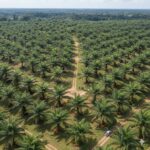By Lucy Ogalue
Lennart Oestergaard, Resident Representative Friedrich- Ebert-Stiftung Nigeria Foundation, says trade is pivotal to the development of Nigeria and Africa as a continent.
Oestergaard said this at a media briefing on Wednesday in Abuja organised to summarise a Policy Focus Book “ How Africa Trades”.
The News Agency of Nigeria (NAN) reports that the meeting was organised by the Foundation in collaboration with the London School of Economics.
According to Oestergaard, trade is of high importance and should be prioritised if we must achieve the Sustainable Development Goals (SDGs) in Africa.
He, therefore, urged the Federal Government to accord priority attention to trade so it could contribute to national development.
Meanwhile, an Economist. David Luke urged the Nigerian government to ensure reduced cost of capital for manufacturers to boost trade in the country.
Luke, a Professor in Practice and Strategic Director, Firoz Laiji Institute for Africa at the London School of Economics (LSE), said the increased capital was a major challenge to trade.
While commending the government for its trade reforms, the professor urged that it should be accompanied by reduced cost of borrowing for business ease.
Luke said: `the reforms that are now being done in Nigeria need to be accompanied very quickly with reducing the cost of borrowing.
“This is because if the productive sector is to respond to the new opportunities, the cost of capital needs to be reduced.
“And this is normal practice when you float a currency.
“In other countries, we have seen that the government has also stepped in very quickly to alleviate the problems.
“Especially in regard to the cost of capital, because that is how businesses can respond to the new opportunities,” he said.
According to Luke, the African Continental Free Trade Area (AfCFTA) is coming up at the right time for Nigeria with these reforms that are going on.
He said this was because it made Nigerian exports cheaper in the African market. Moreover, it sends that signal that imports into Nigeria is becoming more expensive.
“So a lot of what is being imported that can be produced locally should be produced as such.
“The continental market is an attractive market and also should be seen as an important part of these reforms.
“But as we all know, the AfCFTA is struggling with implementation, and Nigerian leadership is needed here,” Luke said.
The professor cited instances in other climes where countries had played similar leadership roles like France and Germany in Europe and Singapore, Indonesia, in Asia.
“So Nigeria is in a very good position to take the leadership for opening up the continental market, which can only make all of us Africans much more prosperous,” he said. (NAN)(www.nannews.ng)
===============
Edited by Ese E. Eniola Williams












